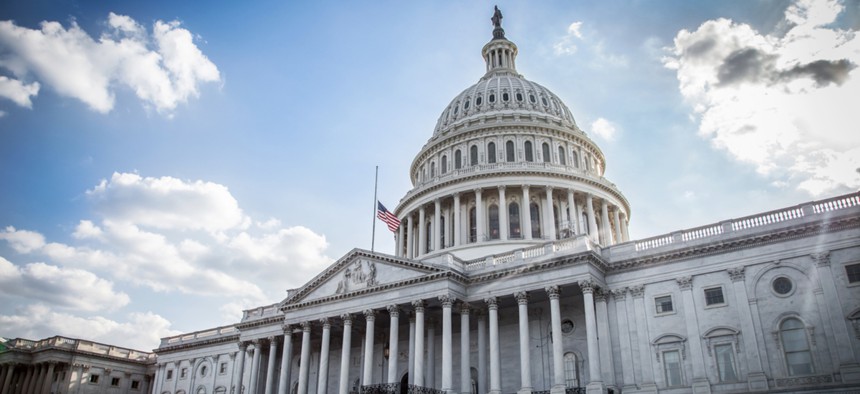Congress Checks In On Modernizing Government Technology Act Progress

Colin Dewar/Shutterstock.com
The Homeland Security reauthorization bill advances but loses an amendment on election security.
Lawmakers on Wednesday will get a mini-state of the union for federal information technology and hear progress made under the Modernization Government Technology Act.
Two House Oversight and Government Reform subcommittees will hear about governmentwide IT modernization plans and persistent issues in buying and implementing IT from a slate of IT officials. Government Accountability Office IT Management Issues Director David Powner, Office of Management and Budget Deputy Director Margaret Weichert, General Service Administration Deputy Assistant Commissioner Bill Zielinski and Homeland Security Department Assistant Secretary for the Office of Cybersecurity and Communications Jeanette Manfra are scheduled to attend.
The MGT Act became law in December as part of the annual defense authorization bill. Focused on updating aging systems, the law creates a central fund that agencies can borrow from and working capital funds where they can stash savings to pay for future IT projects. OMB issued guidance Feb. 27 to agencies for using the provision in the law and announced federal CIO Suzette Kent will lead the board that runs the Technology Modernization Fund.
It’s Official, OPM Has A Permanent Leader
The last time the Office of Personnel Management has a permanent director was in 2015 before Katherine Archuleta resigned after the data breaches that compromised more than 21.5 million federal employees and applicants. The Senate on Wednesday approved nominee Jeff Pon by voice vote. He was nominated in September. Kathleen McGettigan has been serving as acting director.
Homeland Security Inches Closer to Reauthorization
The Senate Homeland Security and Governmental Affairs Committee on Wednesday passed the DHS Authorization Act, which includes provisions to establish a bug bounty program, create cyber talent exchanges, and would elevate and rename the department’s cyber unit the Cybersecurity and Infrastructure Security Agency. But a provision designed to help election security didn’t make it through. Sens. James Lankford, R-Okla., and Kamala Harris, D-Calif., withdrew the Secure Elections Act, an amendment that would authorize the department to share cyber threat information with state election officials unless the Homeland Security secretary has a written, compelling reason not to. And the Senate still needs to work out some jurisdictional issues.
If Record Players Can Be Cool Again...
Legislation directing the Energy Department, intelligence community and national laboratories to look at analog options—or retro approaches—for securing the power grid is advancing in the Senate. The Securing Energy Infrastructure Act passed a Senate committee by voice vote and is included in the text of the 2018 Intelligence Authorization Act awaiting consideration now. An identical companion bill is still in committee in the House.
Tell Us About Your Vulnerabilities
Sen. Ted Lieu, D-Calif., last week wrote a letter to White House Cybersecurity Coordinator Rob Joyce asking whether Congress will get a copy of the Vulnerability Equities Process report—a summary of how the government decides whether to disclose when a software bug is found or keep it for intelligence gathering purposes. Lieu also asked whether the first report will include a report of 2017 activities and what authorities the VEP director has to compel agency compliance.
Senate Moving Forward On FOSTA
A controversial bill aimed at curbing online sex-trafficking that passed the House Feb. 27 is scheduled for a vote in the Senate on Monday. The Allow States and Victims to Fight Online Sex Trafficking Act would allow states and victims to sue websites that are “knowingly assisting, supporting or facilitating a violation” of federal anti-sex trafficking laws, but the tech community argues the bill could open companies to frivolous lawsuits. The current version of FOSTA drew renewed criticism from tech groups as lawmakers amended the language to mirror the bill’s stricter Senate counterpart, which has stalled in the upper chamber since Sen. Ron Wyden, D-Ore., placed a hold on the bill in November.
Procrastinating on Political Ads
The Federal Election Commission delayed a vote on a rulemaking measure that would regulate expressly political advertisements online. The proposal looks similar to the Honest Ads Act, a Senate bill that would require web platforms like Facebook, Google and Twitter to disclose who pays for political ads posted on their sites in the wake of Russian meddling in the 2016 election. Initially introduced by Sens. Amy Klobuchar, D-Minn., Mark Warner, D-Va., and John McCain, R-Ariz., the bill remains stagnated without Republican support.
Coming Up
Budget hearings dominate most of the week but there are few other tech hearings to watch for.
Wednesday morning the House Science, Space and Technology committee checks in with the national labs. A House Energy and Commerce committee examines legislation focused on cybersecurity and emergency response. In the afternoon, a House Armed Services subcommittee hears budgets requests from Defense Department science and technology divisions, including the Defense Advanced Research Projects Agency.
Aaron Boyd contributed to this article.


